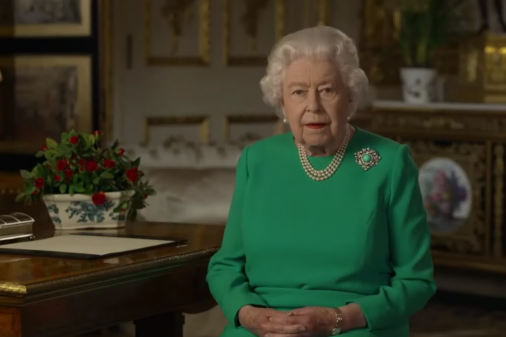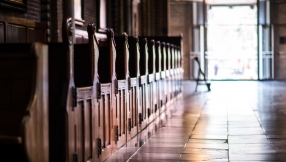
There is a strange public silence about the faith of our Queen. It is almost as if there were a spiritual equivalent to the to the visual impairment of being colour blind - we might call it 'faith-blind'.
For the colour blind, the richness and wonder of colour is inaccessible. Colours are not only what they are, but they act as visual conductors of feeling and emotion. Blue and yellow intimate the vibrancy of joy. Grey and orange convey entirely different feelings. To miss out on colour is to be reduced in what you know, and what you can know, about the world around you.
Faith produces a similar phenomenon. The life, the attitude, the indomitability, the gaiety and the stamina of the Queen flow directly from her relationship with Jesus. The presence, teaching and grace of Jesus colours her personality and her work. When the journalists and politicians talk about how much they admire her qualities of resilience, duty and self-giving, they don't ask the next, and really what ought to be the most obvious question, 'what contributes to her being like that?'
It is a paradox that the Supreme Governor of the Church of England cannot easily give voice to her relationship with God and her devotion to Jesus.
Yet a variety of influences have contoured the growth and development of her faith; and not least the preaching and person of the evangelist Billy Graham. It is well known that while much of the country was in a high state of nervous alarm when Billy Graham came here to run his crusades, the Queen by contrast, welcomed him warmly and was entirely at ease with his company and his evangelism.
Billy Graham described one of their meetings when he wrote in his autobiography: "I always found her very interested in the Bible and its message. After preaching at Windsor one Sunday, I was sitting next to the Queen at lunch. I told her I had been undecided until the last minute about my choice of sermon and had almost preached on the healing of the crippled man in John 5. Her eyes sparkled and she bubbled over with enthusiasm, as she could do on occasion. 'I wish you had!' she exclaimed. 'That is my favourite story.'"
One of the ways in which the quiet furnace of her faith has set light to her public witness from time to time in the public space has been through her annual Christmas messages, which have been getting increasingly personal, profound and pious over the years.
In her message of 2002 she said: "I know just how much I rely on my faith to guide me through the good times and the bad. Each day is a new beginning. I know that the only way to live my life is to try to do what is right, to take the long view, to give of my best in all that the day brings, and to put my trust in God...I draw strength from the message of hope in the Christian Gospel."
In trying to understand what drives her at 95 to continue to serve the nation, offer unstinting cheer, respond with equal dignity to the rich like Bill Gates or the humble dinner lady receiving her MBE, we can look to her understanding of the incarnation. The incarnation of the God of power as a servant king recasts human, value freeing it from snobbery and social hierarchy. It has re-configured her world and the way she recognises the value of human worth. She is no more affirming to a president than she is to a policewoman.
Commentators trace two influences in particular that have made her what she is.
The first is that of her believing and dutiful parents. Few people know that it was her mother's practice to read from the King James Bible to both her daughters every night. Through her mother's devotion and duty she became intimately familiar with the Scriptures.
There is a rather charming story about her father which shines a small light on Princess Elizabeth's growing up as a Christian.
The public remembers that her father George VI broadcast this moving poem "The Gate of the Year" by Mini Louise Haskins, in his Christmas broadcast of 1939. It was just after the Second World War had broken out. But few people know that it was Elizabeth herself, his 13-year-old daughter, who had found it for him and pressed it into his hand to use.
It goes like this:
And I said to the man who stood at the gate of the year: "Give me a light that I may tread safely into the unknown." And he replied: "Go out into the darkness and put your hand into the Hand of God. That shall be to you better than light and safer than a known way." So I went forth, and finding the Hand of God, trod gladly into the night. And He led me towards the hills and the breaking of day in the lone East.
So heart be still: What need our little life Our human life to know, If God hath comprehension? In all the dizzy strife Of things both high and low, God hideth His intention.
Most people recognise the first few lines of the poem but don't know how powerfully it continues with the subsequent verses.
A small indication of her taking the opportunity to mark her faith in some more public act came in 1990. Remembering that she has in fact never expressed a political preference or even given an interview, she did nonetheless contribute to the foreword for a small book published by the Bible Union which explored her Christian faith. It was for her 90th birthday and entitled The Servant Queen and the King She Serves.
In her note, she mentioned the pace of change in her lifetime—the tragedies, wars, and suffering as well as the triumphs, achievements and technological advances. The book carefully noted, "Many commentators have noted the depth of her trust in God but few have explored it."
One of the ways in which her faith and relationship with God have impacted the way she lives and works as the sovereign of the United Kingdom can be traced back to the coronation and her experience of it.
We know that she was deeply impacted by the ceremony and by all it stood for. Not many people are aware of how profoundly Christian the coronation service is.
At its heart lies the rite of anointing. Her head, chest and the palms of her hands are signed in oil with the sign of the cross. The words used are: "As kings, priests, and prophets were anointed, and as Solomon was anointed king by Zadok the priest and Nathan the prophet so be thou, anointed, blessed, and consecrated Queen over the peoples whom the Lord thy God has given thee to rule and govern."
The Archbishop's words link the Queen's body and soul not only to former British kings and queens but also to the priests and prophets of the First Covenant, and the monarch's temporal kingdom to Christ's eternal kingdom.
This anointing is giving effect to a personal vocation, similar to that of a prophet or priest, and she has seen the proper response to this vocation as being rooted in her soul and the price is paid with her life.
From this act of self-giving in response to the call of God to be a Christian monarch, flows Queen Elizabeth's sense of duty.
During her reign the most enormous and seismic cultural shifts have taken place. They have had profound spiritual as well as cultural and philosophical implications.
One of the most important was the replacement of self-giving duty, honour, sacrifice and virtue, with self-indulgence, self-development, self-expression, and moral relativity.
Theologically this represented an abandonment of humble Christian spirituality in favour of a secular narcissism.
The strange paradox is that the Queen's virtues are admired on all sides, but stripped of the recognition that they are profoundly Christian in character. The metaphysical 'colour blindness' seems to make it impossible for the secular mind to join up the dots.
As her reign draws closer to its end, the tragic possibility emerges that as Anglicanism as a popular expression of Christianity was born under and in the reign of the first Queen Elizabeth, so (in popular terms) it may expire in, and at the end, of the second Queen Elizabeth.
If that proves to be the case, it will take place despite the faith, integrity and witness of Her Majesty and not because of it. She will be celebrated and remembered always as the inspirational, admirable and Her most Christian Majesty, Queen Elizabeth the Second.
Dr Gavin Ashenden is a former chaplain to the Queen. He blogs at Ashenden.org











